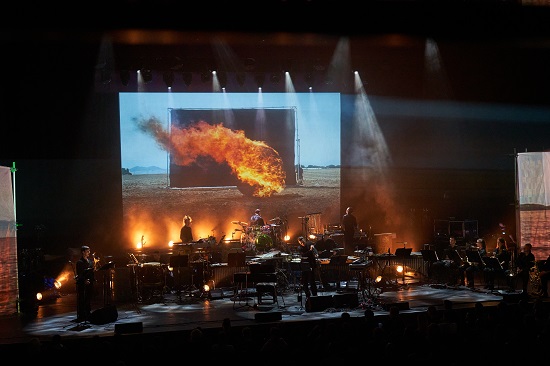Photo by Yoshiaki Miura
“There’s a balance between the brutal stuff and the beautiful bits,” Jack Barnett told tQ when asked about These New Puritans’ plans for tonight’s one-off Barbican show ‘The Blue Door’. That is proven to be true, but a word like ‘balance’ doesn’t quite feel loaded enough to properly encapsulate the fire and bombast that the band express tonight, nor the bursts of radiant beauty that sit in contrast. These New Puritans’ bravery, and brilliance, is the way in which that balance is found – not by watering down or compromising in search of a happy medium, but by trying to express each side in its respective entirety, then clashing them together like atoms in a Hadron Collider and creating something sublime from the aftermath.
The Puritans have been the most ambitious band in Britain for quite some time, but also the most bafflingly under-appreciated, so it’s pleasing to see them play in a setting like The Barbican’s main hall, somewhere that can accommodate the grandness and scope that their art has always demanded. Fourteen musicians wander onstage in no particular order, most of them wearing black boiler suits. Five of them are percussionists wielding three giant vibraphones, timpani drums and electronic pads. There is a guitarist (long-time collaborator Graham Sutton) buried towards the back, two sopranos on one side and a five-piece brass section on the other, the whole ensemble flanked on either side by two scaffolding towers covered with gauze, onto which the band’s name is projected. There is a pleasing lack of symmetry to it all, a jumble of instruments, microphones, platforms and lecterns arranged as if the only concern was fitting them all in, like the contents of a hastily-packed suitcase, until the brothers Barnett enter last. Jack, his hair slicked back, stands at the very front, and George takes his place at the back, his luminous green, yellow and pink drumkit the only flash of colour onstage.
The lights dim and a tremendous hush falls on The Barbican, which is then broken by a thunderous, violent expulsion of sound. The screen behind them flickers on and off, showing evil tangles of branches illuminated by torchlight. The noises become overwhelming and the visuals terrifying as they frantically pan from one impenetrable knot of trees to another, the jumble of musicians suddenly look almost sinister in their dark uniforms as their faces transform into a kind of fanatic concentration. Then comes relief, as the weaving percussive melodies of ‘Infinity Vibraphones’ float in like a dream – the beauty, balancing the brutality.

Photo by Andy Willsher
Here, for the first of many times, it becomes apparent just how spectacular the five percussionists are when they’re all deployed simultaneously. The sight of their limbs flailing in time is breath-taking alone, not to mention the all-consuming lattice of sound it creates. Sometimes melodic and hypnotic, sometimes harsh, jagged and pulverising, the percussion is at the forefront of ‘The Blue Door’s’ beauty and its brutality too. Later, ‘We Want War’ is played with such violence and heft that the players start to resemble a militia, unruly and terrifying as they rumble onwards. Like the percussion, the brass section lends itself equally to the hard and the sumptuous – they can heave like a harbinger of war, and they can envelop you with warmth. The visuals by Harley Weir, Daniel Askill and Alexander Ingham-Brooke – sometimes videos projected behind the band, sometimes nothing more than a strobe light – are employed with delicate precision. Not just a complement to the music or something to look at, they’re charged with energy of their own – images of splendorous human figures and desolate alien landscapes, smoke illuminated orange so that it looks like the glow of a distant creeping fire.
When assembling the musicians for The Blue Door These New Puritans purposely set out to blur the lines between an orchestra and a band “so there’s no separation between those different ways of playing,” as Jack put it to tQ before the gig. With no conductor other than the occasional flourish of a hand from Jack himself, there is “no bored orchestra [who] turns up and scrapes away.” Instead, the band are broken down to 16 individuals performing at their limit. Under this pressure you get a pure visceral sense of their individual energies – the trombonist nodding anxiously to the beat as he waits for his cue, a percussionist whirling wildly from one drum to another as he pushes to keep pace with the vortex of sound that’s surrounding him.
At their head and their tail, however, are the Barnett twins. His drums raised above all the others, George leads the percussive charge from the rear with a calm kind of power, while at centre stage, the only player with much room to manoeuvre, Jack Barnett stands as a frenetic, shapeshifting leader. Sometimes he dances like a flyweight boxer, jabbing at the microphone with his head, sometimes he looks like a smooth, smokey crooner as he sits at a keyboard, and sometimes he’s waiflike, a terrifying phantom. “Let this music be a kind of paradise / a kind of nightmare” he proclaims on ‘A-R-P’, his arms outstretched in exaltation as the band return, to euphoric applause, for their encore.


